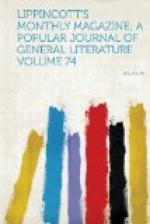“Begorra, thin,” bawled Patsey, “it’s mesilf ut’ll niver vote fur this big Yankee ’ristocrat, innehow. Ef he wuz a foine Irish jintleman, now, er even a r’yal prince av the blud, there’d be no sinse in his airs, bedad!”
Tom and Bill were less noisy in their just wrath, but it ran equally deep: “He belongs to the party. But when Daniel comes up for office—look out! We’ll score a hard day’s work against him, party or no party!”
The major rose to the occasion. Being a bit of a politician and an old-school Democrat, he could not resist the opportunity presented. With a humorous air he sprang to the nearest stump and improvised an electric little speech which sent the men back to labor, madder if not wiser voters.
With other living witnesses of the events narrated, often wondering over the strangeness of the scene of long ago, I am truly glad at the eleventh hour to find the solution of the problem in moods, rather than in a snobbish pride unbefitting the greatness of the man.
F.C.M.
Feuds and Lynch-Law in the Southwest.
A great deal has been said and written lately about feuds and lynch-law in the districts around the lower Mississippi. The reports of recent lynching there have probably been very much exaggerated; and it would certainly be unfair to form a positive opinion about the matter without a thorough knowledge of all the circumstances.
No one who visited that part of the country before the war could return to it now without noticing the higher degree of order and the numerous evidences of progress. But lynching law-breakers and resorting to the knife or pistol to settle private disputes were once ordinary occurrences there, and they were usually marked by a businesslike coolness which gave them a distinctive character.




